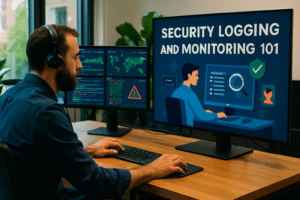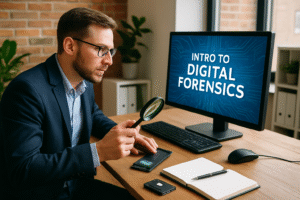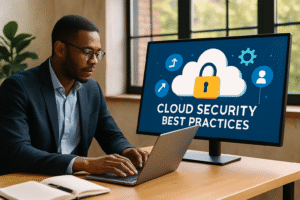
Why cybersecurity matters for everyone
Cybersecurity is often perceived as a technical field for experts, a line of defense reserved for IT professionals, corporations, or government agencies. Yet, in the digital era, its relevance extends far beyond tech teams and corporate boardrooms. Every person who interacts with technology—whether by sending an email, shopping online, or posting on social media—is part of a vast network where digital safety is as crucial as physical safety.
The Digital Thread in Everyday Life
Imagine your morning routine. Perhaps you check the news on your phone, transfer money using a banking app, and log into your work portal, all before breakfast. Each action leaves a digital footprint. These footprints, though invisible, are valuable—and vulnerable. Personal information, financial data, and even our habits are routinely stored, transmitted, and processed online.
Cybersecurity is not only about protecting devices; it’s about safeguarding identities, privacy, and peace of mind. A single compromised account can unravel far-reaching consequences—not just for individuals, but for families, workplaces, and entire communities.
The Human Side of Cyber Threats
Cybercrime is rarely random. Attackers often exploit human tendencies: curiosity, trust, and sometimes distraction. Phishing emails, for instance, cleverly mimic messages from trusted contacts or services. A moment’s inattention—a click on a suspicious link—can invite malware into personal devices and corporate networks alike.
For women and neurodivergent individuals, who may already face unique challenges in the digital world, the risks can be amplified. Online harassment, identity theft, and scams often disproportionately target marginalized groups. That’s why cybersecurity is fundamentally a matter of digital self-advocacy and empowerment.
Understanding the Basics: What Is Cybersecurity?
At its core, cybersecurity is the practice of protecting systems, networks, and programs from digital attacks. These attacks are often aimed at accessing, changing, or destroying sensitive information; extorting money; or interrupting normal business processes. But beyond these technical definitions, cybersecurity is also about building habits and awareness.
“The best defense in cybersecurity is not just strong passwords or the latest software—it’s an informed and vigilant user.”
Simple steps such as enabling two-factor authentication, using unique passwords, and regularly updating software can dramatically reduce your vulnerability. Cybersecurity, therefore, is a shared responsibility: everyone has a role to play.
Why Cybersecurity Is for Everyone—Not Just Experts
It’s easy to delegate digital safety to IT departments or security software, but technology is only as effective as the people who use it. Think of cybersecurity like locking your doors at night. The most advanced lock is useless if you forget to turn the key. By integrating cyber awareness into daily routines, we protect ourselves and those around us.
For educators and parents, teaching young people about online risks and responsible behavior is as important as teaching them to look both ways before crossing the street. In workplaces, fostering a culture of security—where everyone feels responsible for reporting suspicious activity—creates a safer digital environment for all.
Cybersecurity and the Modern Career
The digital skills gap is a well-documented challenge, especially in fields like STEM. Yet, cybersecurity offers a unique entry point for those looking to build a career in technology, regardless of background or prior experience. The demand for cybersecurity professionals is high and growing, but basic cyber awareness is also a highly valued skill in non-technical roles.
From finance to healthcare, education to retail, every sector relies on secure digital systems. Employers increasingly seek candidates who understand the importance of protecting data, following best practices, and respecting user privacy. For women and neurodiverse individuals, whose perspectives are crucial to building inclusive and resilient systems, cybersecurity offers both a career path and a means of self-empowerment.
Neurodiversity and Cybersecurity: An Inclusive Perspective
The cybersecurity field is enriched by diverse ways of thinking. Many neurodivergent people—such as those with autism, ADHD, or dyslexia—bring unique strengths to the table: pattern recognition, creative problem-solving, and attention to detail. These abilities are invaluable in identifying threats and developing innovative defenses.
However, the digital world can also present specific challenges. Complex user interfaces, ambiguous security warnings, or overwhelming information may create barriers. Accessible design and clear communication are essential—not just for compliance, but to ensure that everyone can participate in and benefit from a safer digital society.
“Cybersecurity is strongest when it reflects the diversity of its users and defenders.”
Everyday Actions That Make a Difference
There’s a misconception that cybersecurity requires advanced knowledge or expensive tools. In reality, many effective practices are simple, free, and accessible to all. Here are a few habits that can significantly enhance your digital safety:
- Use strong, unique passwords for each account. Consider a password manager to help you keep track.
- Enable two-factor authentication wherever possible, adding an extra layer of security.
- Be cautious with emails and messages from unknown senders. If something feels off, verify before clicking.
- Keep devices and software updated to protect against the latest vulnerabilities.
- Back up important data regularly, so you’re prepared in case of loss or attack.
These steps are not just for tech enthusiasts—they are essential life skills for the modern world.
Empowering Yourself and Others
Learning about cybersecurity is an ongoing journey. The landscape is always evolving, with new threats and technologies emerging every day. It’s important to stay curious, ask questions, and seek out trustworthy resources. Many organizations offer free courses, workshops, and online materials suitable for all ages and abilities.
Sharing what you learn can make a powerful difference. Talk to friends and family about online safety. Encourage conversations in your workplace or community. By normalizing these discussions, we foster a culture where digital safety is valued and supported.
The Future of Cybersecurity: A Collective Responsibility
The next generation of technology—artificial intelligence, smart homes, wearable devices—will bring new opportunities and new challenges. As the boundaries between our online and offline lives continue to blur, cybersecurity will become even more integral to our daily existence.
It’s easy to feel overwhelmed by headlines about data breaches or sophisticated hacking groups. But the most effective response is not fear—it’s engagement. By understanding the basics, adopting good habits, and supporting those around us, we each contribute to a safer, more resilient digital world.
Cybersecurity as Digital Citizenship
Ultimately, cybersecurity is not just a technical issue—it’s a form of digital citizenship. It’s about respecting ourselves and others, thinking critically about the information we share, and taking responsibility for our online actions. This mindset empowers us to navigate the digital world with confidence and compassion.
“Every click, every password, every act of caution strengthens the fabric of our shared online community.”
The internet’s promise lies in its openness and connectivity. By practicing good cybersecurity, we help preserve that promise—not just for ourselves, but for everyone who logs in after us.


